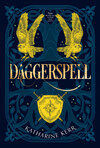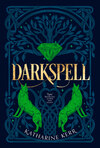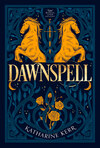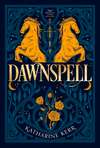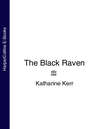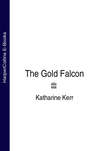Читать книгу: «The Deverry Series», страница 4
DEVERRY, 643
If you write in the sand with a stick, soon the waves and wind will wash away the words. Such are the mistakes of ordinary men. If you cut words into stone, they remain forever. A man who claims the dweomer becomes a chisel. All of his misdeeds are graved into the very flank of time itself…
The Secret Book of Cadwallon the Druid
The storm came at sunset, hard rain and wind that made the spring forest tremble. By dawn, the roof of the hut was leaking, a thin but steady trickle in the corner that grooved the dirt floor before it escaped under the wall. Rhegor stood with his hands on his hips and watched it run.
“The way out won’t be so easy for you.”
“I know,” the prince said. “But I’ll be back here before the Beltane feast. I swear it.”
Rhegor smiled as if he doubted it. He picked a couple of big logs off the woodpile in the corner and laid them on the small stone hearth. When he waved his hand over the logs, flames sprang up and flared along the bark. The prince let out his breath with a little hiss.
“You’ll have to get over your infatuation with these tricks,” Rhegor said. “The true dweomer lies deeper than that.”
“So you’ve said, but I can’t lie and say I’ve already gotten over it.”
“True enough. You’re a good lad in your way, Galrion.”
As supple as a cat, Rhegor stretched his back, regarding the prince with shrewd eyes. Rhegor looked like an old peasant, short, barrel-chested, dressed in a dirty pair of brown brigga and a patched plain shirt with a bit of rope round his waist for want of a proper belt. His gray hair hung cropped and untidy; his gray mustache always needed a trim. At times, when he wasn’t watching his thoughts, Prince Galrion wondered why he was so impressed with this man that he’d follow his orders blindly. It’s the dweomer, he told himself. Who needs wealth when you’ve got the dweomer?
“Have you been thinking about this betrothed of yours?” Rhegor said.
“I have. I’ll do what you told me.”
“You should be doing it because you understand the reasons, not just following my commands like a hunting dog.”
“Of course. But you’re sure? I can bring her with me?”
“If she’ll come. Marry her first, then bring her along.” Rhegor glanced around the skew-walled hut. “It’s not a palace, but we’ll build her a better home by winter.”
“But what if she doesn’t want to come?”
“If she chooses freely, then release her.” Rhegor paused for effect. “Freely, mind you.”
“But if she—if we—have a child?”
“What of it?” Rhegor caught his sulky glance and stared him down. “A vow is a vow, lad, and you swore one to her. If this were the usual arranged marriage, it would be different, but you sought her and won her. A man who can’t keep his word is of no use to the dweomer, none.”
“Very well then. I’ll ride to Brangwen before I go and lay the matter before my father.”
“Good. She deserves the news first.”
Wrapped in his cloak of scarlet-and-white plaid, Galrion mounted his black horse and rode off through the unbroken forest of ancient oaks. In a little while, he would return as a poverty-stricken exile to study the dweomer—if he could fight himself free of his old life.
Galrion was the third of the four sons of Adoryc, High King of all Deverry. With two healthy heirs ahead of him, and one behind in reserve, he was a disposable young man, encouraged all his life to spoil himself with his beloved horses and hunting, so that he’d present no coveting threat to his eldest brother’s claim on the throne. He saw no reason why he shouldn’t ride away from court, out of the way for good and no longer a drain on the royal treasury. Yet he doubted if his father would see things so simply. Adoryc the Second, the ruler of a recent and unstable dynasty, seldom saw anything simply.
And there was the matter of Brangwen, the lord’s daughter whom Galrion had won over many another suitor. Only a few months ago, he’d loved her so much that the wait of their betrothal time seemed an unjust torment. Now he saw her as a potential nuisance. Rhegor admitted that Galrion would make slower progress with his studies if he had a wife and children than if he were alone. There were duties a man had to fulfill if he were married, Rhegor always said, but after twenty-two years of having every one of his royal whims satisfied, Galrion was in no mood to hear talk of duty. He was used to having exactly what he wanted, and he had never wanted anything as much as he wanted dweomer power. He hungered after it and thirsted for it.
Or, as he thought about it during his damp ride through the forest, wanting the dweomer was a lust, a burning inside him. Once he’d thought he lusted for Brangwen, but now a new lust had driven that passion out. To delve into secret lore, to learn and master the secret ways of the universe, to stand in control of forces and powers that few people even knew existed—against rewards such as those, mere love looked as valuable as a pebble lying in the dirt.
The prince’s ride was a short one. One of the many things bemusing Galrion these days was the way that Rhegor had chosen to settle so close to the Falcon clan and Brangwen, where Galrion could stumble across him and dweomer both. If he’d been but ten miles farther south, I’d never have found him, Galrion thought. Truly, dweomer must be my Wyrd. It occurred to him that his love for Brangwen was probably just a tool in the hands of his Wyrd, drawing him to Rhegor. Rhegor himself, of course, had already hinted that there were other, important reasons that Galrion had fallen in love with her; Galrion’s heart sank as he remembered those hints.
Just as the drizzle died into a cloudy noon, he rode out of the woods into cleared fields and saw the Falcon dun, rising at the crest of an artificial hill, built for defense in this flat country. Round the base of this motte ran a pair of earthworks and ditches; at the top stood a wooden palisade with iron-bound gates. Inside stood the squat stone broch and a clutter of round wooden sheds and huts for the servants. As Galrion led his horse in, the muddy ward came alive with servants—a groom running to take his horse, a page to take his saddlebags, the chamberlain to greet him and escort him ceremoniously inside. As the aged chamberlain struggled with the heavy door, the prince glanced up. Over the lintel hung a severed head, blackened, weather-shrunken, with rain dripping from the remains of a blond beard. Brangwen’s father, Dwen, held to the ways of the Dawntime warriors. No matter how much the priests reproached him, no matter how often his daughter begged him to have it taken down, Dwen stubbornly kept his trophy up, the head of his worst enemy from a long blood feud.
The great hall was warm, smoky and light-shot from the fires burning at either side. Up by the bigger hearth, Dwen and Gerraent were drinking in their carved chairs with a pack of staghounds sleeping in the straw by their feet. Gerraent rose to greet Galrion, but Dwen stayed seated, sodden in his chair, a florid-faced man whose rheumy eyes glanced up through folds of skin. It was hard to believe that in his youth he must have looked much like his son, this tall blond warrior, square-shouldered, with an arrogant toss to his head.
“Good morrow, my liege,” Gerraent said. “My sister’s in her chamber. I’ll send a page for her.”
“My thanks.” Galrion bowed to Dwen. “My lord.”
“Sit down, lad, and have some ale.” Dwen wheezed as he spoke, then coughed and nearly choked.
Galrion felt a cold shudder, a bristling of hairs along the back of his neck as if a draft had touched him. Although Dwen had been ill for years and never seemed to sicken further, Galrion knew with a sharp stab of dweomer that soon he would die. A page brought Galrion ale, a welcome distraction from Dwen’s illness. When Galrion raised the tankard to Gerraent in friendly salute, Gerraent forced out a smile that was the barest twitch of his mouth. It didn’t take dweomer to know that Gerraent hated him. Galrion merely wondered why.
The door across the great hall opened, and Brangwen came in with her maidservant in attendance. A tall lass, willow slender in a dark green dress, she wore her long blond hair caught back in a simple clasp, as befitted an unmarried woman. Her eyes were as deep and blue as a winter river. The most beautiful lass in all Deverry, men called her, with a face that was dowry enough for any man in his right mind. Drawn by the love he’d thought he’d cast out, Galrion rose to greet her. He took both her hands in his.
“I didn’t think to see you soon, my prince,” Brangwen said. “This gladdens my heart.”
“And it gladdens mine, my lady.”
Galrion seated her in his chair, then took a footstool from the maidservant and put it down to keep Brangwen’s feet off the damp, straw-strewn floor. He perched on the edge of the stool and smiled up at her while she laughed, as merry as sunlight in the dark room.
“Will his highness honor me by riding with me to the hunt tomorrow?” Gerraent said.
“I won’t, by your leave,” Galrion said. “I have things to discuss with my lady.”
“She’s not your lady yet.” Gerraent turned on his heel and stalked out of the hall.
When he slammed the door shut behind him, Dwen roused from his doze, glanced round, then fell back asleep.
“Oh, here, Gwennie,” Galrion whispered. “I hope I haven’t offended your brother by not riding with him on the morrow.”
“Oh, Gerro’s in such a mood these days. I can’t talk a word of sense into him about anything. Here, my love, don’t you think it’s time he married? He’s put it off awfully late. He’ll be twenty at the turning of the summer.”
“True enough.” Galrion was remembering his dweomer-warning of Dwen’s coming death. “He’ll be the Falcon someday, after all. Is there any woman he favors?”
“Not truly. You men can be such beasts.” Brangwen giggled, hiding her mouth behind her hand. “But, well, Gerro rides to hunt with Lord Blaen of the Boar, and his sister’s just absolutely mad for Gerro. I’ve been trying to speak well of her to him, but he doesn’t much listen.”
“I’ve seen the Lady Ysolla at court. She’s a lovely lass, but naught compared to you, of course.”
The compliment brought another giggle and a blush. At times Brangwen was a helpless little thing, unlike the women at the court, who were trained as partners in rulership. Once Galrion had looked forward to the chance to prune and form his wife’s character; now, he found himself thinking that she was going to absorb much of his time.
“Do you know what Ysolla told me?” Brangwen said. “She said that Blaen’s jealous of you.”
“Indeed? That would be a serious matter if it’s true.”
“Why?”
“Ye gods, think! The Boar Rampant was involved in many a plot against the last dynasty. A lover’s rivalry is a political matter when one of the rivals is a prince.”
“Truly, my apologies.”
She turned so woebegone over his snap that Galrion patted her hand. She bloomed instantly and bent down to allow him to kiss her cheek.
Circumstances conspired to keep the prince from having his necessary talk with his betrothed. All evening, Gerraent kept them sullen company. On the bright and sunny morrow, Brangwen settled her father outside in the ward, then sat down beside him with her needlework. Much to Galrion’s annoyance, the old man stayed wide awake. Finally, when Gerraent stopped by on his way to hunt, Galrion decided that since he might soon be Gerraent’s elder brother, he might as well put that authority to good use.
“Here, Gerro,” Galrion said. “I’ll ride a little way with you after all.”
“Well and good.” Gerraent shot him a glance that said the exact opposite. “Page, run and saddle the prince’s horse.”
Preceded by a pack of hounds and followed by a pair of servants, Galrion and Gerraent rode to the woods. The Falcon clan lay lonely on the edge of the kingdom. To the north, the clan’s farmlands stretched out until they met those of the Boar, their only near neighbor. To the east and south was nothing but unclaimed land, meadow, and primeval forest. It occurred to Galrion that Brangwen was doubtless looking forward to the splendid life at court that he could no longer give her.
“Well, young brother,” Galrion said at last. “There’s something I wanted to talk with you about. My lady Brangwen tells me that you’ve won the favor of Ysolla of the Boar. She’d make any man a fine wife.”
Gerraent stared straight ahead at the road.
“You’re a man now,” Galrion said. “It’s time you married for your clan’s sake. The head of a clan needs heirs.”
“True spoken. I know my duty to my clan.”
“Well, then? Blaen’s your sworn friend. It would be a fine match.”
“Did Gwennie put you up to this talk?”
“She did.”
Gerraent glanced his way with bitter eyes.
“My sister knows her duty to the clan, as well.”
As they rode on, Gerraent was lost in thought, his hand on his sword hilt. Galrion wondered how this proud man was going to take it when Galrion swept his sister off to a hut in the forest instead of the palace. The prince was vexed all over again at his stupidity in getting himself betrothed just as he had found the dweomer.
“Does Gwennie think Ysolla would have me?” Gerraent said.
“She does. She’d bring a fine dowry, too.”
They rode in silence for some minutes while Gerraent considered, his mouth working this way and that as if the thought of marrying a rich, pretty wife pained him. Finally he shrugged as if throwing off a weight from his shoulders.
“Grant me a boon, elder brother,” Gerraent said. “Will you ride to Blaen with me as my second in the betrothal?”
“Gladly. Shall we ride soon?”
“Why not? The soonest done, the best.”
That evening, dinner marked a celebration. While the Falcon’s demesne stretched broad and prosperous, there had been few sons born to the clan over the past generation. If Gerraent should die without an heir, the clan would die with him, its lands reverting back to the High King for reassignment. Every now and then, Galrion noticed Gerraent looking at the blade of his table dagger, where a falcon mark was graved, the clan’s symbol, and his whole life, his duty, and power.
After Brangwen escorted her father from the table, Galrion had a chance at a private word with Gerraent.
“My lady Brangwen was teasing me the other night,” Galrion said. “Saying Blaen’s jealous of me. Is that just a maid’s chatter?”
“It’s true enough.” Gerraent made the admission unwillingly. “But she’s dwelling on the thing to please her vanity. Blaen will forget her soon enough. Men in our position marry where we have to, not to please ourselves.”
Galrion felt a cold touch like a hand down his back, the dweomer-warning of danger. Never had that warning failed to be true, not since he’d felt it first as a little lad, climbing a tree and knowing without knowing how he knew that the branch was about to break under him.
The dun of the Boar clan lay a full day’s ride to the north. A stone broch rose three floors above a cobbled ward and proper wooden round houses for the important servants. Off to one side were the stables that also doubled as a barracks for the warband of twelve men. Lord Blaen’s great hall was fully forty feet across with a dressed stone floor. Two tapestries hung on either side of the honor hearth, and fine furniture stood round in profusion. As he walked in, Galrion had the thought that Brangwen would be far happier in that dun than she would be in a wilderness.
Blaen himself greeted them and took them to the table of honor. He was a slender man, sandy haired, good-looking in a rather bland way with blue eyes that always seemed to be smiling at a jest.
“Good morrow, my prince,” Blaen said. “What brings me the honor of having you in my hall?”
“My brother and I have come to beg an enormous favor. My brother has decided that it’s time for him to marry.”
“Oh, have you, now?” Blaen shot Gerraent a smile. “A wise decision, with no heirs for your clan.”
“If it’s so wise,” Gerraent snapped, “why haven’t you made one like it?”
Blaen went as stiff as a stag who sees the hunting pack.
“I have two brothers.”
The moment hung there. Gerraent stared into the hearth; Blaen stared at the prince; Galrion hardly knew where to look.
“Ah, curse it!’” Blaen snapped. “Can’t we dispense with all this mincing around? Gerro, do you want my sister or not?”
“I do. And my apologies.”
When Galrion let his eyes meet Blaen’s he saw only a man who wanted to be his friend—against great odds, perhaps, but he did. Yet the dweomer-warning slid down his back like snow.
In his role as a courting man’s second, Galrion went to the woman’s hall, a half-round of a room above the great hall. On the floor lay Bardek carpets in the clan colors of blue, green, and gold; silver candlesticks stood on an elaborately carved table. In a cushioned chair, Rodda, dowager of the clan, sat by the windows while Ysolla perched on a footstool at her mother s side. All around them lay wisps of wool from the spinning that must have been tidied away at the prince’s approach. Rodda was a stout woman with deep-set gray eyes and a firm but pleasant little smile; Galrion had always liked her when they’d met at court. Ysolla was a pretty lass of sixteen, all slender and golden with large eager eyes.
“I come as a supplicant, my lady,” Galrion knelt before the two women. “Lord Gerraent of the Falcon would have the Lady Ysolla marry him.”
When Ysolla caught her breath with a gasp, Rodda shot her a sharp look.
“This is a grave matter,” Rodda pronounced. “My daughter and I must consider this carefully.”
“But, Mother!”
“My lady?” Galrion said to Rodda. “Do you have any objections to Lord Gerraent?”
“None, but I have my objections to my daughter acting like a starving puppy grabbing a bone. You may tell Gerraent that we are considering the matter, but my son may start discussing the dowry if he wants—just in case Ysolla agrees.”
Blaen was expansive about the dowry. Ysolla, of course, had been filling her dower chest for years with embroidered coverlets, sets of dresses, and the embroidered shirt her husband would wear at his wedding. To go with it, Blaen offered ten geldings, five white cows, and a palfrey for Ysolla.
“Gerro?” Galrion said. “That’s splendidly generous.”
“What?” Gerraent looked up with a start. “Oh, whatever you think best.”
Yet that evening Gerraent acted the perfect suitor, happy to have his lady within his reach at last. At table, he and Ysolla shared a trencher, and Gerraent cut her tidbits of meat and fed her with his fingers as if they were already married, a gesture that made Ysolla beam with happiness. Galrion and Rodda, who were seated next to each other, found themselves watching the couple and occasionally turning to each other to share a thoughtful glance. Since the bard was singing, and Blaen laughing with his brother, Camlann, Galrion and Rodda could whisper in private.
“Tell me,” Rodda said. “Do you think Gerraent will come to love my daughter someday?”
“He’d be a fool not to.”
“Who knows what you men will do?”
Galrion broke a slice of bread in half and offered her one portion.
“Is this better than no bread at all?”
“You’re a wise one for someone so young, my prince.” Rodda accepted the bread. “Does that come from living at court?”
“It does, because if you want to live to be an old prince, you’d best keep your eyes on every little wave of everyone’s hand and your ears on every word they speak.”
“So I’ve been telling your little Gwennie. Life at court is going to be difficult for her at first. She’s lucky to have a man like you to watch over her interests.”
Galrion felt a stab of guilt. I’m as bad as Gerro, he thought. I’ll have to offer Gwennie at least the half a piece of bread—unless I find her a man who’d give her the whole loaf.
Courtesy demanded that Galrion and Gerraent take the Boar’s hospitality for several days. The more Galrion saw of Blaen, the more he liked him, a cultured man as well as a generous one, with a fine ear for the songs of his bard and a proper knowledge of the traditional tales and lore. Even more, Galrion came to admire Rodda, who carried out her dowager role with perfect tact. She would make Brangwen a splendid mother-in-law. At times, Galrion remembered Rhegor’s insistence that she choose freely, but he doubted if Gwennie, poor little innocent Gwennie, was capable of making such an important decision on her own.
Late on the second day, the prince escorted the dowager to the garden for a stroll. The spring sun lay warm on the glossy leaves and the first shy buds of the roses.
“I’m much impressed with your son,” Galrion said. “He should feel more at home at my court.”
“My thanks, my prince.” Rodda hesitated, wondering, no doubt, how to turn this unexpected honor to her son’s advantage. “I’m most grateful that you favor him.”
“There’s only one slight thing. You’ll forgive my bluntness, and I’ll swear an honest answer will do Blaen no harm. Just how much does he hold Gwennie against me?”
“My son knows his duty to the throne, no matter where his heart lies.”
“Never did I think otherwise. I was merely wondering how fine his honor might be in matters of the heart. Let me be blunt again. Suppose Brangwen was no longer betrothed to me. Would he spurn her as a cast-off woman?”
Briefly Rodda stared, as openmouthed as a farm lass, before she recovered her polished reserve.
“I think my prince is troubled at heart to speak this way.”
“He is, but he’ll beg you never to ask why. He’ll tell you this much: he’s troubled by the life ahead of Brangwen. Flatterers at court will come around her like flies to spilled mead.”
“Not just flies, my prince. Wasps come to spilled mead, and Gwennie is very beautiful.”
“She is.” Suddenly torn, Galrion wondered if he could truly let her go. “And I loved her once.”
“Once and not now?” Rodda raise a doubting eyebrow.
Galrion walked a little ways ahead, letting her catch up with him in the shade of the linden tree. He caught a low branch and stripped the leaves off a twig, to rub them between his fingers before he let them fall.
“My prince is deeply troubled,” Rodda said.
“The prince’s troubles are his own, my lady. But you never answered me. Would Blaen marry Gwennie if he could?”
“Oh, in a moment! My poor lad, I swear he’s been ensorcled by Gwennie’s blue eyes. He put off marrying until she came of age, and then, well—”
“The prince stepped in, giving the Boar another reason to chafe under the High King’s rule. How would the Boar take it if his mother hinted that the prince was yielding to a prior claim?”
“I’ve no doubt he’d honor the prince always.”
Smiling, Galrion made her a deep bow. It could work out well, he told himself. Yet at the thought of Brangwen lying in another man’s arms, his heart flared rage.
When the day came for Prince Galrion to ride back to court, Gerraent accompanied him for a few miles simply because he was expected to. The prince smiled and chattered until Gerraent wanted to murder him and leave his body in a ditch by the road. At last they reached the turning, and Gerraent sat on his horse and watched the prince’s scarlet-and-white plaid cloak disappear into the distance. Three more weeks, only three more weeks, and the prince would return from Dun Deverry to take Brangwen away. With her, Gerraent’s heart would go, breaking.
When he rode back to the dun, Gerraent found Brangwen sitting outside in the sun and sewing. He gave his horse to Brythu, his page, and sat down at her feet like a dog. Her golden hair shone in the sun like finespun thread, wisping around the soft skin of her cheeks. When she smiled at him, Gerraent felt stabbed to the heart.
“What are you sewing?” Gerraent said. “Somewhat for your dower chest?”
“It’s not, but a shirt for you. The last one I’ll ever make, but don’t worry, Ysolla does splendid needlework. I’ll wager that your wedding shirt is ever so much nicer than my poor Galrion’s.”
Gerraent rose to his feet, hesitated, then sat again, trapped in his old torment, that his beautiful sister, the one beautiful thing in his world, would turn him into something ugly and unclean, despised by the gods and men alike, if ever they knew of his secret fault. All at once she cried out. He jumped to his feet before he knew what he was doing.
“I just pricked my finger on the beastly needle,” Brangwen said, grinning at him. “Don’t look so alarmed, Gerro. But, oh, here, I’ve gotten a drop of blood on your shirt. Blast it!”
The little red smear lay in the midst of red interlaced bands of spirals.
“No one’s ever going to notice it,” Gerraent said.
“As long as it’s not a bad omen, you’re right enough. Doubtless you’ll get more gore on it than this. You do get so filthy when you hunt, Gerro.”
“I won’t wear it hunting until it starts to wear out. It’ll be my best shirt, the last one you ever sewed for me.” Gerraent caught her hand and kissed the drop of blood away.
Late that night, Gerraent went out to the dark, silent ward and paced restlessly back and forth. In the moonlight, he could see the severed head of old Samoryc glaring down at him with empty eye sockets. Once every dun and warrior’s home would have been graced with such trophies, but some years past, the priests had seen visions stating that taking heads had come to displease great Bel. Of all the lords round about, Dwen was the last to defy the change. Gerraent remembered the day when the priests came to implore him to take the trophy down. A tiny lad, then, Gerraent hid behind his mother’s skirts as Dwen refused, roaring with laughter, saying that if the gods truly wanted it down, they’d make it rot soon enough. Chanting a ritual curse, the priests left defeated.
“I’m the curse,” Gerraent said to Samoryc. “I’m the curse the gods sent to our clan.”
He sat down on the ground and wept.
The days passed slowly, long days of torment, until Gerraent fled his sister’s presence and rode to Blaen on the pretense of seeing his new betrothed. He and Blaen were more than friends; the year before, when they’d ridden to war together, they’d sworn an oath that they would fight at each other’s side until both were dead or both victorious, and they had sealed that oath with drops of their own blood.
In his blood-sworn friend’s soothing company Gerraent spent a pleasant pair of days, drinking at Blaen’s hearth, hunting out in his forest preserve, or riding aimlessly across his lands with the warband behind them. Gerraent envied Blaen for having a warband. He was determined to get one of his own; the ten horses that he’d receive in Ysolla’s dowry would be a splendid start, and soon Brangwen’s royal marriage would bring wealth to the Falcon, a lwdd, a blood price of sorts—but too small a compensation for the losing of her.
On the third day, late in the afternoon, Gerraent and Blaen rode out alone. Enjoying each others silent company, they ambled through the fields until they reached a low rise that overlooked meadowlands. Tended by a pair of boys and a dog, Blaen’s herd of white cattle with rusty-red ears grazed below.
“Let’s hope there’s no war this summer,” Blaen said.
“What? What are you doing, turning into an old woman?”
“I’m not ready to start sucking eggs yet, but I’ll tell you somewhat I’d never tell any other man. There are times when I wish I’d been born a bard, singing about wars instead of fighting them.”
Thinking it a jest, Gerraent started to laugh, then stopped at the quiet seriousness in Blaen’s eyes. All the way home, he puzzled over it, remembering Blaen’s calm courage in battle and wondering how any man would want to be a bard rather than a warrior. They returned to the dun at sunset. As he dismounted, Gerraent saw Brythu running out of the broch.
“My lord!” the boy panted out. “I just got here. Your father’s dying.”
“Take the best horse in my stable,” Blaen said. “Break him if you have to.”
When he rode out, Gerraent left the page behind so that he could make good speed. He galloped through the twilight, alternately trotted and galloped even when dark fell, though the road lay treacherous in the pale moonlight. Not for one moment did it occur to him that he might be thrown. All he could think of was his father, dying without a last sight of his son, and of Brangwen, tending the dying alone. Whenever the horse stumbled, he would let it walk to rest, then spur it on again. At last he reached the small village on the edge of his lands. He banged on the tavern door until the tavernman came hurrying down in his nightshirt with a candle lantern in his hand.
“Can you change my horse?” Gerraent said.
“Lady Brangwen had the gray brought here to wait for you.”
The gray was the fastest horse in the Falcon’s stable. Gerraent switched saddle and bridle, flung the tavernman a coin, then kicked the gray to a gallop, plunging out of the candlelight and into the night-shrouded road. At last he saw the dun rising, the palisade dark against the starry sky. He spurred one last burst of speed out of the gray and galloped through the open gates. As he dismounted, the chamberlain ran out of the broch.
“He still lives,” Draudd called out. “I’ll tend the horse.”
Gerraent ran up the spiral staircase and down the hall to his father’s chamber. Propped up on pillows, Dwen was lying in bed, his face gray, his mouth slack as he fought for every breath. Brangwen sat beside him and clutched his hand in both of hers.
“He’s home. Da,” she said. “Gerro’s here.”
As Gerraent walked over, Dwen raised his head and searched for him with rheumy eyes. Dwen tried to speak, then coughed, spitting up a slime of blood-tinged phlegm, slipping and glistening as his head fell back. He was dead. Gerraent wiped the spittle off his father’s mouth with the edge of the blanket, then closed his eyes and folded his arms across his chest. The chamberlain came in, glanced at the bed, then flung himself down to kneel at Gerraent’s feet—at the feet of the new Falcon, head of the clan and its only hope.

